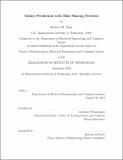| dc.contributor.advisor | Matthias Winkenbach. | en_US |
| dc.contributor.author | Tran, Robert H.(Robert Hall) | en_US |
| dc.contributor.other | Massachusetts Institute of Technology. Department of Electrical Engineering and Computer Science. | en_US |
| dc.date.accessioned | 2020-03-24T15:37:07Z | |
| dc.date.available | 2020-03-24T15:37:07Z | |
| dc.date.copyright | 2019 | en_US |
| dc.date.issued | 2019 | en_US |
| dc.identifier.uri | https://hdl.handle.net/1721.1/124266 | |
| dc.description | This electronic version was submitted by the student author. The certified thesis is available in the Institute Archives and Special Collections. | en_US |
| dc.description | Thesis: M. Eng., Massachusetts Institute of Technology, Department of Electrical Engineering and Computer Science, 2019 | en_US |
| dc.description | Cataloged from student-submitted PDF version of thesis. | en_US |
| dc.description | Includes bibliographical references (pages 53-56). | en_US |
| dc.description.abstract | This thesis investigates implementing online learning methods to predict the station status in Bike Sharing Systems (BSSs). Accurate station status prediction has immediate benefits for BSS users and operators. The number of incidences of when BSS users try to rent a bike from an empty station or return a bike to a full station and the cost of manual rebalancing by BSS operators to restore the number of bikes at each station to its target level can both be reduced. Instead of implementing offline learning methods with large historical datasets, we adopt an online approach where the model continuously updates with new data. As the station status data is typically available as a real-time feed, online learning is a suitable technique for station status prediction. We devise a system to automatically ingest multiple data feeds to construct online learning models that can predict and update in real-time. This thesis studies 15 stations in the BSSs of Boston, Washington, D.C., and New York City. The online prediction system we present updates every 2 minutes, making 1-hour predictions of the number of bikes for each station at each time step. We evaluate our online prediction models by simulating the station status feed collected from December 1st, 2018 through May 31st, 2019. We report that online learning models can achieve significantly better performance, measured by mean squared error and percentage of more accurate predictions, compared to naive models. | en_US |
| dc.description.statementofresponsibility | by Robert H. Tran. | en_US |
| dc.format.extent | 56 pages | en_US |
| dc.language.iso | eng | en_US |
| dc.publisher | Massachusetts Institute of Technology | en_US |
| dc.rights | MIT theses are protected by copyright. They may be viewed, downloaded, or printed from this source but further reproduction or distribution in any format is prohibited without written permission. | en_US |
| dc.rights.uri | http://dspace.mit.edu/handle/1721.1/7582 | en_US |
| dc.subject | Electrical Engineering and Computer Science. | en_US |
| dc.title | Online prediction with bike sharing systems | en_US |
| dc.type | Thesis | en_US |
| dc.description.degree | M. Eng. | en_US |
| dc.contributor.department | Massachusetts Institute of Technology. Department of Electrical Engineering and Computer Science | en_US |
| dc.identifier.oclc | 1145277594 | en_US |
| dc.description.collection | M.Eng. Massachusetts Institute of Technology, Department of Electrical Engineering and Computer Science | en_US |
| dspace.imported | 2020-03-24T15:37:05Z | en_US |
| mit.thesis.degree | Master | en_US |
| mit.thesis.department | EECS | en_US |
